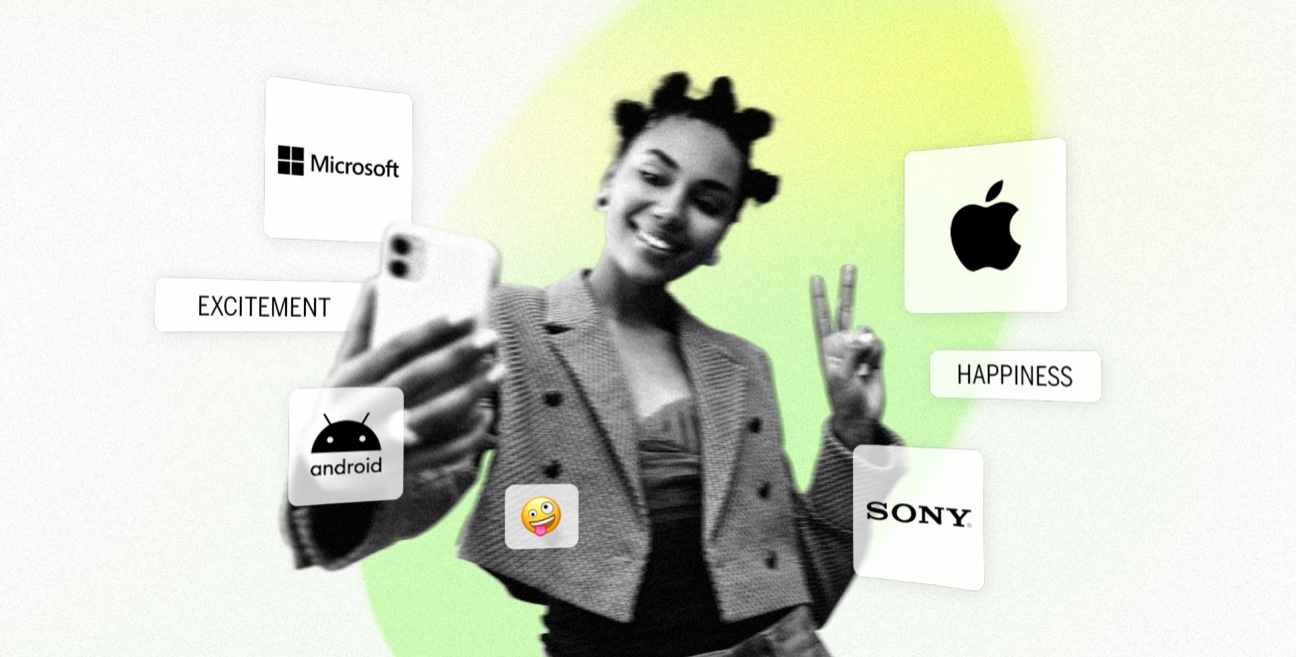Overview
- The technology & telecommunications industry ranks second in our 2022 Brand Intimacy Study.
- Apple ranks third overall in our 2022 Study, behind Disney and Tesla. Apple is the highest-ranking tech & telecom brand.
- 63% of Apple customers are in some form of intimacy with the brand: this is the highest percentage of any brand in our study.
Introduction
Our previous two COVID Brand Intimacy studies tracked shifting behaviors and norms of consumers, like the rise of work-from-home, and our growing dominance and dependence on tech & telecom brands. From the moment we wake up to check our smartwatch for the night’s sleep score to the last text message and movie before bedtime, our lives increasingly rely on technology for work, health, entertainment, and play. We continue to see the results of all these interactions with the tech industry’s ascendency in our most recent 2022 Brand Intimacy rankings.
Brand Intimacy Performance
Technology & telecommunications has an average Brand Intimacy Quotient of 49.2, well above the cross-industry average of 36.8. The category has improved since our last study, where it ranked in fourth place, and improved its Quotient score performance by 8%. This tells us, even as we return to more “normal” life post pandemic lockdowns, our dependency on technology brands has increased.
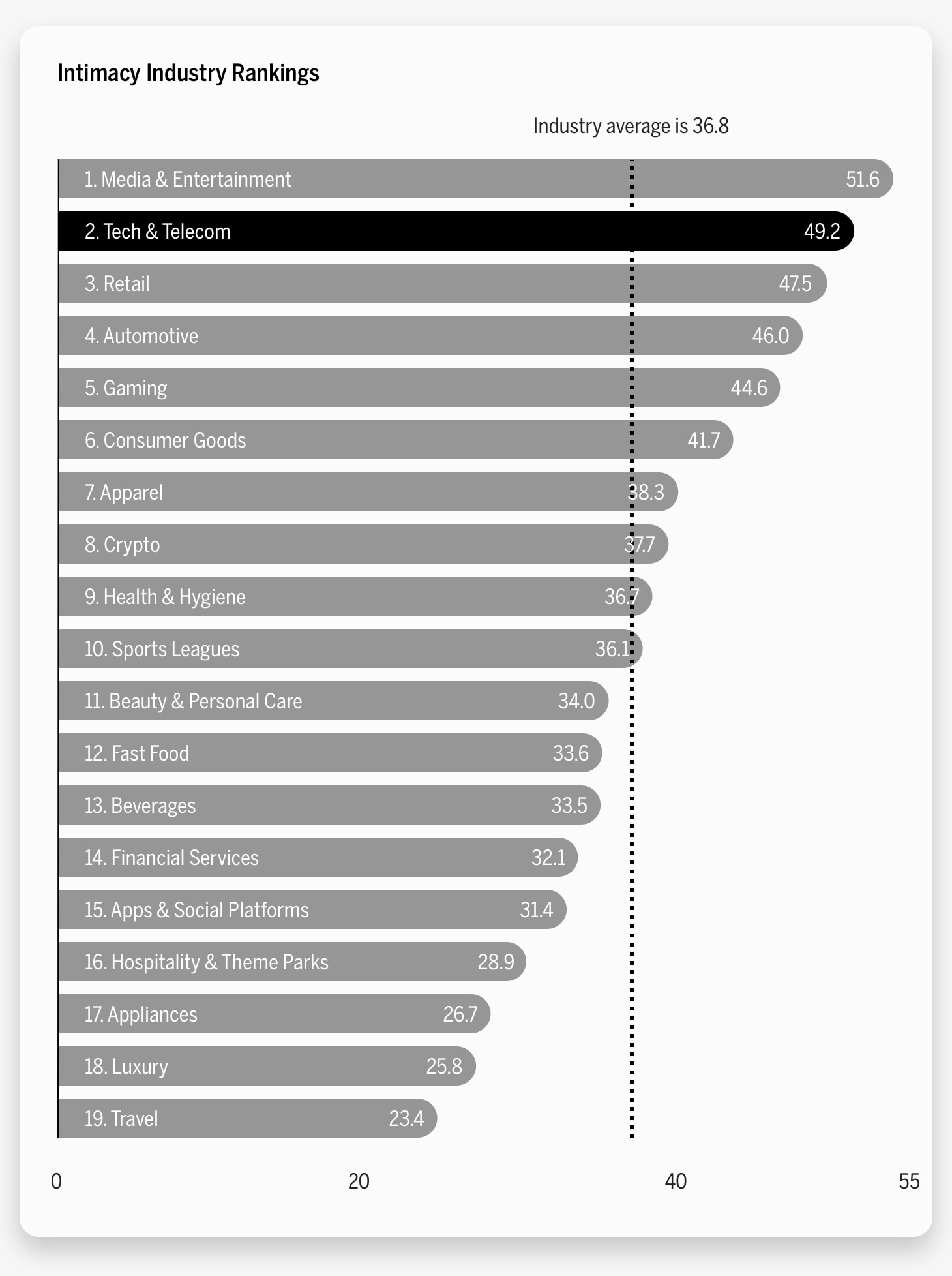
Top Tech & Telecom Brands
All this dependence can result in love, frustration, and everything in between for the brands we use most, depending on factors like the quality of products and the ability of these companies to connect with users. For the top tech & telecom brands, we see strong correlating keywords that support their specific emphases and applications. Sony is respected for its top gaming platform, while Microsoft is known for its business and Windows brands. Apple gains strength in Music and Health, two deeply personal categories that result in similarly personal keywords customers use to describe their attachment to the brands across social media.
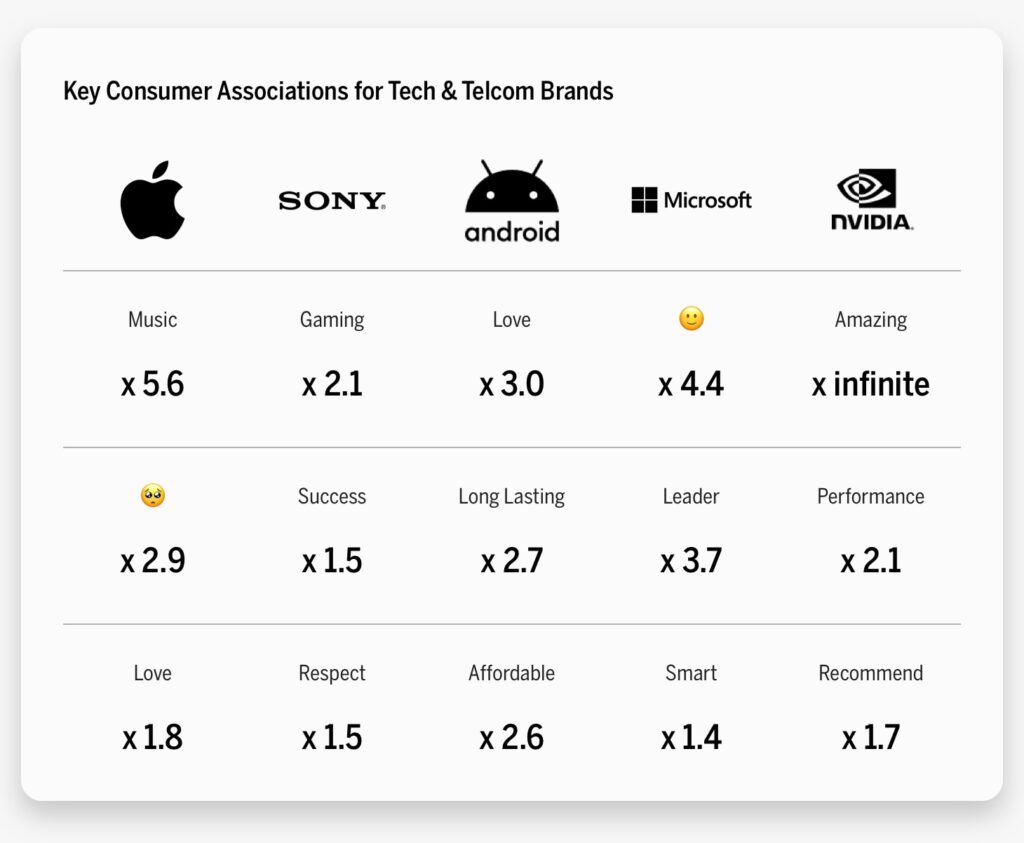
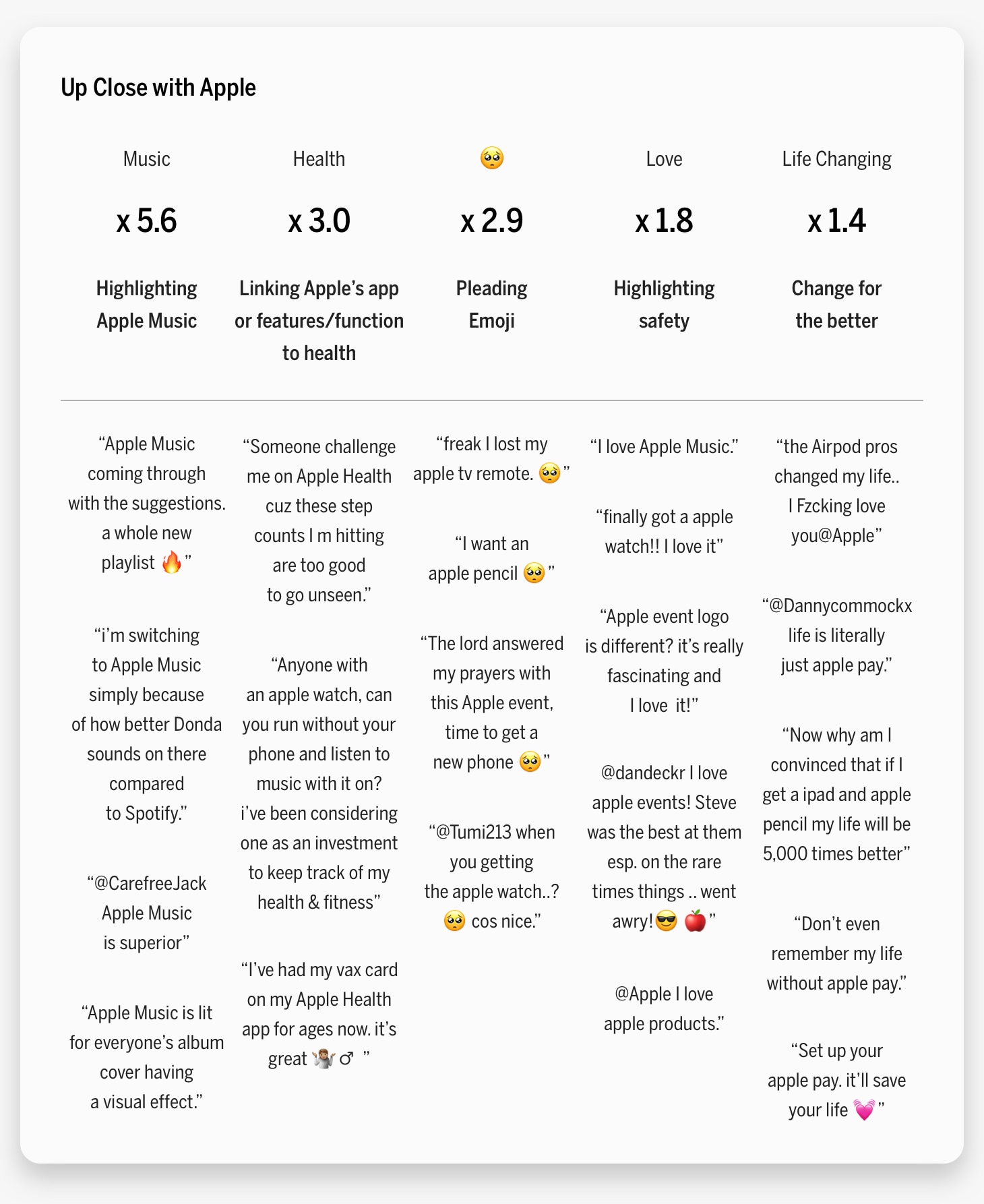
Consumers speak about Apple in highly emotional terms. From desire and pleading for Apple products,

to adoration and love


to its life-altering products and offerings


But how has Apple, more than any other brand in our study, been able to connect so intimately with customers?
The Rise of Apple
For nearly 50 years, Apple has been developing computers, smartphones, music, and health products that add value to consumers’ lives, and along the way captured an incredible following of dedicated users and brand advocates. Beyond its financial results, Apple has garnered multiple brand awards, from topping Fortune’s World’s Most Admired Companies list to the 2022 World’s Most Ethical Companies® from Ethisphere.
In our study this year, Apple ranks third overall and is the top-ranking tech & telecom brand. Apple was the top-ranking most intimate brand in our study for multiple years, most recently in our COVID 2020 and 2021 studies. During our COVID study, almost 40% of Apple users said their emotional connection to the brand increased during COVID, and 55% said they used Apple more during the pandemic.
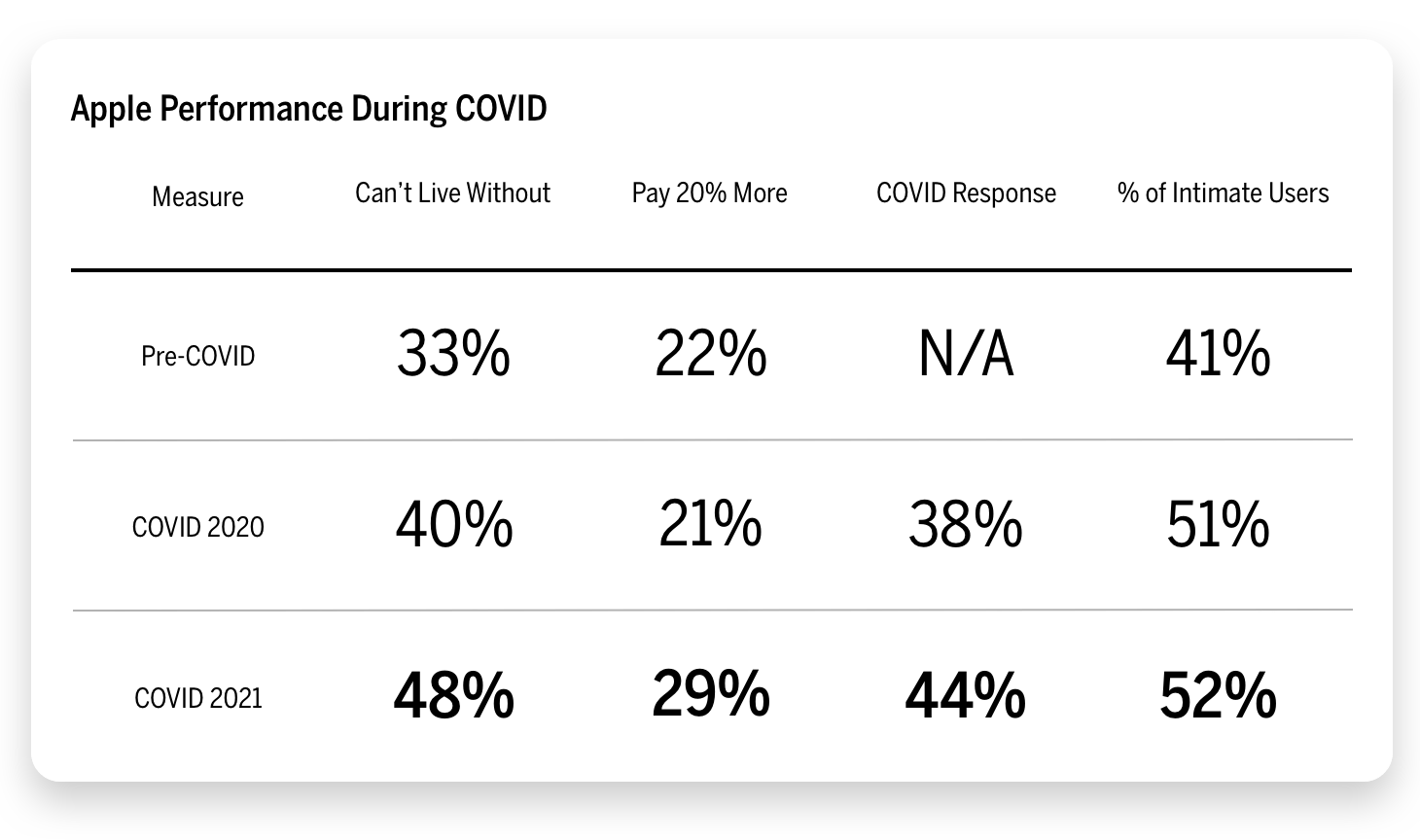
Personal Products that Resonate
One way Apple has achieved a high level of intimacy is through its leading software/hardware expertise focused mainly on the personal areas of our lives. Apple best personifies the Brand Intimacy archetype of enhancement: Customers that become better through use of Apple—smarter, more capable, and more connected. From online to physical stores to customer service, marketing, and communication, the brand isn’t just one of the biggest companies in the world—it is also one of the best run and performing.
With the rise of COVID and the emphasis on staying healthy, Apple has intensified its push to provide key data and information tracking to monitor our bodies. The newest Apple Watch 7 offers indispensable health and wellness tools, including an electrical heart sensor and ECG app and a blood oxygen sensor and app. WatchOS 8 helps users stay healthy through a new Mindfulness app, sleep respiratory rate tracking, and new Tai chi and Pilates workouts that can help improve overall wellness. The Mindfulness app features an enhanced breathe experience, a new reflect session type, and guided meditations.
Pushing deeper into our day-to-day lives, Apple, along with Samsung, Google, Amazon, and other top tech brands, plan to release Matter, a new standard that enables smart home devices to talk to one another regardless of the virtual assistant or phone brand. With more than 250 technology companies expected to adhere to the new standard, we’ll be trusting Apple and other brands with ever more personal details of our lives.
Today, Apple products touch nearly every area of our lives, with new categories on the way, from more powerful smartphones and computers to an AR/VR Headset and an Apple Car. Although other brands offer competitive products, one of Apple’s core strengths in building brand relationships is through offering services and solutions that support timely components of trust and responsibility.
Building Trust Builds Intimacy
With the increasing dominance of and dependence on technology comes the need for brands to prove they are trustworthy and responsible enough to be a close part of our lives.
Across the tech landscape, consumers are increasingly concerned about how companies use their personal and health data. For responsive companies like Apple, this has led to major changes on their platforms to ensure data security. Last year, Apple reaffirmed its commitment to protecting users with improved App Tracking Transparency on its platforms, giving users the ability to disable ad-tracking, which can be especially important for sensitive health data monitoring.
In May 2022, to promote the features of its new privacy tools, Apple launched a “Privacy on iPhone” marketing campaign to highlight how users can control who can see their data and who can’t. The ad has received over 15 million views on YouTube.
Another area of recent focus has been on the right to repair our products that are often intensely personal. Devices that we wear or carry with us 24 hours a day can feel more like a trusted friend than an inanimate object. Combined with improving artificial intelligence that allows us to talk and interact with a human voice, it’s no wonder we often prefer to fix our broken technology than simply trade it in for a new model.
To that end, Apple recently announced a “Right to Repair” program. For years, Apple maintained strict control over how its products could be fixed, but in response to customer concerns, the new program will allow individuals to access the parts and guides needed to fix their iPhones and Mac computers themselves. Other companies are following, with Microsoft announcing plans to increase the options consumers have to repair their devices by the end of 2022. Dell, also in our top 10 tech & telecom rankings, has introduced Concept Luna that focuses on PC sustainability and repairability.
Conclusion
Our bonds with tech & telecom products and the brands that build them have intensified in recent years. As new, more intimate devices become available that track, monitor, and improve every personal aspect of our lives, our relationship with companies will in turn deepen. Customers using these technologies need to feel the companies behind them are trusted and on their side. Brands like Apple are at the forefront of building and developing trust and emotional bonds that support this connection through programs, policies, and campaigns that reflect customer concerns and reassure users.
The results for Apple, as indicated in this year’s study, is a high level of emotional connection that affects consumer decision-making and the way they talk and feel about the brand. Apple’s products, policies, services, and marketing work together to create unique experiences, address customer needs, and build bonds and establish reciprocity with users.
Get an overview of Brand Intimacy here.
Read our detailed methodology here. Our Amazon best-selling book is available at all your favorite booksellers. To learn more about our Agency, Lab, and Platform, visit mblm.com.
